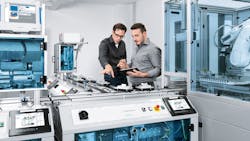Hydraulics & Pneumatics discusses why training is a key for the quick deployment of digital manufacturing products with Christopher Haug, manager of international trade press at Festo AG & Co. KG.
Q: What strategies are emerging to help design engineers address problems?
Haug: The earlier machine and plant manufacturers and operators opt for digital products, the greater the benefits for them. Examples of these intelligent, comprehensive software solutions are the Handling Guide Online for fast design and ordering of axis systems, the Festo Design Tool 3D online for combining individual components into pneumatic modules, the product key for the clear identification of each component and use as a digital twin, and app-based products.
Thanks to the fast activation of new functions via apps, machine developers can create a basic machine type and then, depending on which apps are selected, equip it with different functions and features as per the customer’s requirements.
Assigning functions via software has the added benefit of preventing tampering and protecting know-how, since it’s not possible to tell from the outside which functions the valves are executing. Maintenance is also simplified, as long lists of spare and wearing parts will be a thing of the past.
The automation products of today and the near future are characterized by high flexibility, connectivity and individuality. This is possible thanks to the progress made by digitalization and artificial intelligence as well as by new materials applied in valve technology like piezo technology.
Q: What’s the big challenge for the future? And what’s the opportunity that comes from that challenge?
Haug: Technical hurdles will not be the problem: Digitalization and artificial intelligence will enhance and make much easier engineering performances. The problem might be more the inertia of humans and their minds. Many employees are not open to new developments and methods and might be reluctant to this digital transformation. Some even fear losing their jobs in the age of digitalization.
The digital products are available, but people often fall back on conventional methods of working together. It is therefore important that everyone adapts to changes in the collaborative process and learns new roles. New forms of collaboration such as Design Thinking provide the necessary agility and responsiveness to ever-changing environments.
Design Thinking is more than a process, it is a change in mindset. In daily work, its potential for problem-solving develops into a living culture of innovation. It is not just about design or innovations, but rather solving complex problems. Design Thinking promotes and demands collaborative creativity to solve complex tasks in an integrated and customer-oriented way. It is also about unconventional approaches.
Haug: Economic researchers estimate that in 2030 up to one-third of all employees worldwide will have to look for a different job because digitalization and Industry 4.0 will have made their jobs obsolete. It is therefore all the more important for all managers to inspire and motivate their employees and support them on their journey to the new world of work. And how can automation technology companies develop during this process?
If companies want their management structures to still be successful in 10 years’ time, they have to adopt a Leadership 4.0 model. The main goal is to create a sense of belonging. This includes demonstrating confidence in employees and transferring more and more responsibilities to them.
Another main aspect of the digital transformation at Festo is to prepare customers for the age of digitalization. That is why Festo Didactic offers turnkey learning factories, laboratory facilities and innovative learning systems, e-learning, and training courses. The cyber-physical learning platform CP Factory, for example, models the stations of a real production plant and allows people to learn plant programming, networking, as well as many other topics such as energy efficiency and data management.
By developing specific competencies, employees can be supported in the change process Industry 4.0.
About the Author
Bob Vavra
Senior Content Director, Power & Motion and Machine Design
Bob Vavra is the Senior Content Director of Power & Motion and its sister publication Machine Design. Vavra has had a long career in publishing, media and events. He has covered all aspects of manufacturing for the past 20 years and is a regular attendee at events such as IMTS and Hannover Messe. Vavra is also a sought-after webcast moderator and event emcee, and has presided over events in the U.S., Germany and China.

Leaders relevant to this article:

